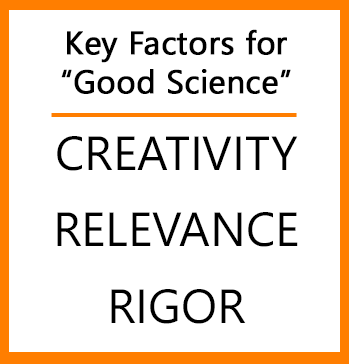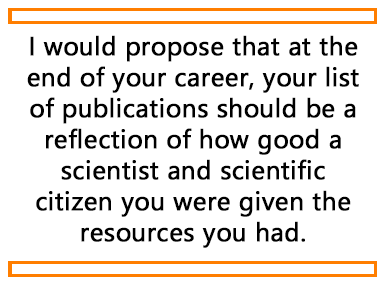
Publishing is an integral part of science. From our first semester in graduate school, we’re made aware that publications (papers, proceedings, and, decreasingly, book chapters) are the “coin of the realm” for a toxicologist. They’re the way we communicate what we’ve found. They’re how our academic institutions measure our contributions and impact to our field. And, for academics, they’re how we show the funding institutions that we’ve been productive with their money and investing in us is likely to yield future returns. There are various ways to measure impact, but those measurements are all used for the same thing: to reflect how “good a scientist” you are. That’s the boiled-down bones of why we publish. But what else we put on those bones determines whether we wind up with a Jethro or a Beyoncé after we’ve been doing this for a while. What follows is one old toxicologist’s larger view of how and why to publish and how to improve it for everyone.
 Published papers are direct windows into your brain. They can reveal how you think and whether or not you’re doing “good science.” And when it comes to good science, I believe that there are three key aspects:
Published papers are direct windows into your brain. They can reveal how you think and whether or not you’re doing “good science.” And when it comes to good science, I believe that there are three key aspects:
- Creativity. Great, award-winning papers depend completely on the creativity of the investigator at the very beginning, before any reagent bottles are opened or cells or animals dosed. A paper can ever be only as good as the hypothesis you’re testing and the way you choose to test it. Not all our work has to be straight-up dose-response characterizations or gene expression descriptions. Additionally, choosing to formulate the question differently or more provocatively makes it both more fun to do the work and much more fun to write the paper. For example, you can take what’s known in one area and apply it to a completely different field—instead of thinking about cell-cell junctions morphologically, think of them as kinase chains, which allows for control of adhesion and release … and control by kinase inhibitors. When I’ve served as a judge for a Best Paper Award, I tend to focus on the importance of the field of work and the creativity of the approach, which are both baked in before any actual lab work is done. Spending some extra effort up front to find a cool approach will go a long way to building a reputation for useful creativity, which is actually pretty rare in science.
- Relevance. This is often addressed at the funding stage. No one wants to fund useless science, but relevance also depends on the context of the work. Work which is relevant for an academic grant could be completely irrelevant for a pharmaceutical safety lab, and the opposite is certainly true. The sweet spot is those occasions when circumstance provides you with a question which is relevant for multiple settings or audiences. If you find yourself in this situation, grab that sucker and go (i.e., take advantage of that opportunity), because it’s a rare gift.
- Rigor. In this context, I use this word to mean “doubting yourself and using safeguards to assure the elimination of bias.” It means doing the experiment the more laborious way even when you could have almost as much confidence in the result using a shorter method. It means testing your assumptions in an impartial and unbiased way—the old “try to prove yourself wrong” thing. That kind of rigor, honestly applied, can be a fragile flower, and the best scientists make sure they nurture and protect it.
Yes, good work also may require diversity of thought and determination to power through adversity, blah blah blah, but I have observed that creativity, relevance, and rigor contribute disproportionately to outstanding work and make publishing a joy, instead of a chore. Selfishly, it also makes your papers more fun to read.

Another way of looking at this is that at the end of your career, you will likely be remembered mostly for your written history (i.e., your publications). Early in my career I thought that instead of randomly accreting papers and a reputation, maybe some forethought and planning on my part could yield an opus with a common thread, perhaps something approaching a theme. Time has proven that both right and wrong. It’s wrong in the sense that many of my papers resulted from momentary opportunities that I grabbed because I could and because I thought that they might help another scientist out there (being a “good scientific citizen,” which I’ll address more in a moment). But it was right in that I found that I put more heart and effort into those pubs which hit my sweet spot, which for me were methods papers or book chapters. And the value of those “favorite children” is enlarged in retrospect, enjoyed more each time they are recalled. But still, the idea of “beginning with the end in mind” is worth some considered thought at the start of your career.
Finally, we should publish not just to show that we can, but to be the good scientific citizen I alluded to. This means contributing information and perspective to discussions among scientists. The best scientific citizens intentionally cultivate wisdom, which can be described as “thoughtfully evaluating or embracing a viewpoint broader than your own,” although the longer definition makes you realize the idea of cultivating wisdom involves a whole lot more. Excellent work on this can be found at the Center for Practical Wisdom at the University of Chicago, but the point is that a scientific discourse involves not only our data, but our data’s broader meaning and impact. These days, it also means taking a skeptical view of whether there is even a replicable effect in your work and a willingness to admit that there might not be.
 I would propose that at the end of your career, your list of publications should be a reflection of how good a scientist and scientific citizen you were given the resources you had. Creativity, relevance, and rigor are all key components, but I really value creativity the most. The most insightful science comes from asking different questions or asking them in a different way. It’s the hardest thing to do and is thus the characteristic which will most set you apart from your peers.
I would propose that at the end of your career, your list of publications should be a reflection of how good a scientist and scientific citizen you were given the resources you had. Creativity, relevance, and rigor are all key components, but I really value creativity the most. The most insightful science comes from asking different questions or asking them in a different way. It’s the hardest thing to do and is thus the characteristic which will most set you apart from your peers.
You also must not forget your sense of humor. We all know that lab work makes us cry sometimes, so please make lots of opportunities for laughter. We’ve got to keep this fun, right, or why the heck should we bother?! Be creative, work as hard as you can, and make your colleagues laugh, and your career will be less like a job and more like a gift.
Editor's Note: Dr. Chapin recently served on the SOT Board of Publications.